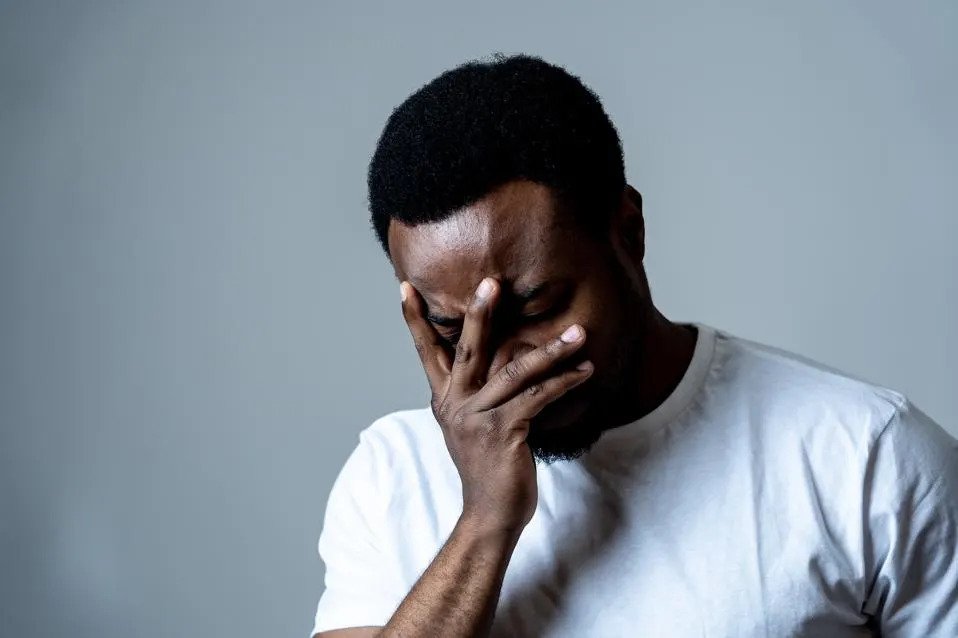Depression in Black men is a silent epidemic, with many suffering behind a mask of strength.
Do you know that black men are one of the most vulnerable groups to depression, but they rarely seek help as compared to other groups?
The National Institute of Mental Health (NIMH) also reveals that Black men are twice as likely to suffer from depression than White men, but they are less likely to be diagnosed and treated appropriately.
Social expectations, cultural prejudices, and the scarcity of mental health services are some of the factors that compound this problem, making many Black men suffer in silence.
To help patients end the silence and get the care they need to improve their mental health, the first step is learning the signs of depression.
In this article, we will identify nine indicators of depression in Black men and explain how awareness of these warning signs can result in transformative action.
Recognizing Depression in Black Men
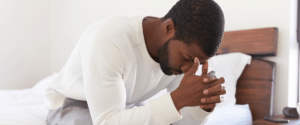
It is not enough to know what depression is when it comes to the Black men’s experience.
Cultural attitudes and social norms are critical in how Black people encounter, understand, and manage depression.
Many Black men face high expectations to be strong and independent, and they are often discouraged from showing emotions.
Consequently, this creates a problematic situation that not only stigmatizes mental health issues but also reduces them to mere stress.
Additionally, mental health remains a taboo in African and African American communities; as a result, people frequently avoid discussing it, deny their experiences, or feel ashamed.
Furthermore, this societal pressure makes many Black men feel trapped, unable to express their true emotions.
Due to these constraints, they often refrain from communicating their feelings or using appropriate methods to manage their anger, stress, or frustration.
Instead, they might resort to unhealthy coping mechanisms such as binge drinking or becoming violent.
The African American experience further has systemic racism, poor economic status, and distrust of the health systems, which are the reasons why depression is underreported.
For instance, a study conducted by the Journal of the American Medical Association (JAMA) shows that Black men are more likely to suffer from untreated depression, as only 18 % of them seek help from professionals.
In comparison, 35% of them have mental health problems.
Such statistics show the importance of embracing the Black community to discuss mental health issues and supporting those who seem to struggle.
9 Warning Signs of Depression in Black Men
1. Constant Fatigue or Lack of Energy

Lack of energy, even after having had enough sleep, is usually a sign of depression.
Not only muscle tiredness but also spirit exhaustion make everyday tasks seem like a chore.
This can be especially so for Black men, who are usually pulled in many directions and may thus attribute such feelings to fatigue.
2. Persistent Feelings of Sadness or Hopelessness
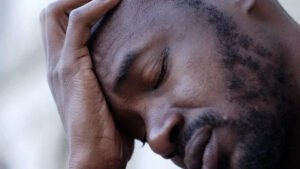
Depression can be characterized by an individual’s persistent feeling of sadness or hopelessness.
This can be especially so for Black men due to the culture and social norms that require them to remain strong, and therefore, it becomes hard for them to show such feelings.
Such emotions may remain unrecognized or untreated, contributing to the deterioration of the patient’s condition.
3. Physical Ailments without a Clear Cause

It is a fact that while suffering through depression, one does not only feel low but also experiences a lot of physical manifestations.
Headache, joint and muscle pain, backache and stomach pain, and other pains that diseases cannot explain might be symptoms of depression.
It is for this reason that many Black men may not even associate these physical signs with their mental health, and as such, they receive inadequate treatment or wrong diagnoses.
4. Increased Irritability or Anger
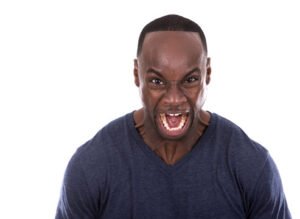
Depression in Black men doesn’t manifest through mood swings, withdrawal, or sadness like it does in others. Instead, it often shows up as irritability and anger.
They often suppress their emotions, which leads to frustration and anger.
Depression, in this manner, creates tension in relationships, and it becomes tough for the people close to the affected person to identify the real problem.
5. Withdrawal From Family and Friends

Lack of interaction with people often indicates depression.
If a man avoids friends, family, and social events, it might indicate that he is emotionally disturbed.
To the Black men, the sense of loneliness may be even more heightened since they may feel like no one is there for them or understands what they go through.
6. Changes in Appetite and Weight

Depression may lead to changes in appetite, and therefore, people suffering from depression may lose or gain weight.
Such changes in eating patterns may have other physiological effects that intensify the depressive phase.
7. Difficulty Concentrating or Making Decisions

Depression usually leads to challenges in concentration or even in problem-solving, and for Black men, it may translate to difficulties in decision-making or even in completing tasks.
It can hinder one’s ability to perform tasks at work or home, resulting in frustration and a worsening sense of failure or incompetence.
8. Loss of Interest in Activities Once Enjoyed
When depression sets in, even things that were once considered fun, hobbies, sports, or spending time with family and friends may no longer be appealing.
This may mean avoiding significant communal activities or pulling back from previously meaningful or defining activities for Black men.
9. Thoughts of Death or Suicide
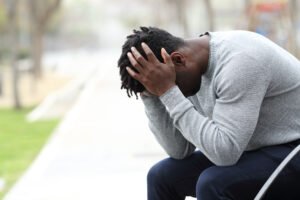
If you or someone you know is considering suicide, they must consult a healthcare provider as soon as possible.
Taking Action: Overcoming the Stigma and Seeking Help

Let’s shift the Black Men’s Depression Paradigm.
Mental health issues have remained a taboo, and therefore, many men have not sought treatment as they should.
One has to realize that confessing about a mental issue is not a weakness but strength and bravery.
Friends being able to talk to someone and seek therapy or counseling can go a long way.
Given the fact that Black men are constantly under pressure to be strong, emotionally unencapsulated, and stoic, it is essential to stand for them and end the culture of non-disclosure.
Promoting mental health literacy among African and African American males will ensure that they know when they need help and where to get the help without staining.
How to Support a Black Man Experiencing Depression
Supporting a Black man when he is depressed involves listening, offering help, and showing care.
Here are some ways you can help:
- Encourage open conversations: Make him understand that expressing his feelings without being scolded is acceptable. Deprogrammation of mental health is a taboo topic.
- Offer to help find resources: Whether finding a therapist or getting advice on community mental health programs, sometimes practical support can make all the difference.
- Be patient and listen: Depression is not something that can be treated in a day, and Black men may not share everything with you at first. Your patience and willingness to listen can be a much-needed relief.
Conclusion: What to Do for Improved Mental Health

This article has shown that Black men also experience depression, and it’s time people show empathy and take action to help eliminate this issue.
Now that you’ve learned about the signs, how will you manage your mental health or support someone else?
Will you take that first step to get help or begin a conversation that may save someone’s life?
It is as important as physical health; if you don’t start treating it now, you will suffer even more later.
Don’t wait—act now. The question is – what is holding you back from focusing on your mental health?
————————————-
At Enthusiast Express, we know that Black men experience many issues that may affect their mental health.
Our platform focuses on helping African and African American men lead the best lives possible by providing them with all the necessary tools and support.
Whether you are looking for information on how to get through a day, real-life experiences, or expert advice on staying mentally and emotionally healthy, Enthusiast Express is your home.
Sign up today to join Enthusiast Express and open the door to mental and physical health.

